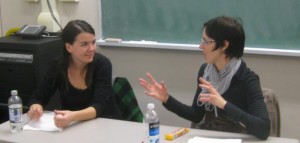 We are constantly describing. “I’m nervous about the interview” or “He’s such a funny guy” or “You have to pick that up.” Our days are filled up with talking, or listening to others talk or reading what others have written, and all of these activities of language are basically matters of description.
We are constantly describing. “I’m nervous about the interview” or “He’s such a funny guy” or “You have to pick that up.” Our days are filled up with talking, or listening to others talk or reading what others have written, and all of these activities of language are basically matters of description.
In many situations, this pervasiveness of description is obvious. Sitting in a coffee-shop, one need only listen to what others are saying to notice the constant string of descriptions that constitute everyday discourse: descriptions of what her romantic life is like, descriptions of what his boss said next, descriptions of their trip to the Atlas Mountains, descriptions of the plan for next year.
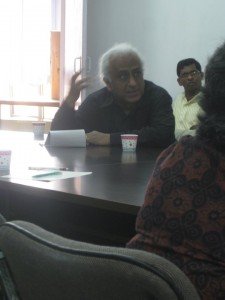 Sometimes, our uses of language are not so obviously descriptions. When we study language in elementary school, we are taught to distinguish imperative sentences from descriptive sentences: a command, we say, is expressing a relationship different from that expressed in a description. In a limited sense this is no doubt correct, but at a deeper level it is false. When I order you to do something, I am using my expression to represent the reality of the situation. Though explicitly I do not describe, implicitly my command asserts (a) that I am a person who has the authority to command you, and (b) that the situation demands this action from you. The command, in other words, depends upon an implied description, an implicit assertion of what is the case.
Sometimes, our uses of language are not so obviously descriptions. When we study language in elementary school, we are taught to distinguish imperative sentences from descriptive sentences: a command, we say, is expressing a relationship different from that expressed in a description. In a limited sense this is no doubt correct, but at a deeper level it is false. When I order you to do something, I am using my expression to represent the reality of the situation. Though explicitly I do not describe, implicitly my command asserts (a) that I am a person who has the authority to command you, and (b) that the situation demands this action from you. The command, in other words, depends upon an implied description, an implicit assertion of what is the case.
Descriptions are a matter of expressing what is the case, and they can be true or false, better (truer) and worse. This is true in an obvious way of the trip to the Atlas Mountains: has one given the correct dates, the correct sequence of events? In a less obvious, but still fairly familiar way, we can recognize a deeper matter of truth here, too. It may well be that all my sentences are factually correct (getting the dates and sequence of events right), and yet they may not be really truthful, in that they subtly imply that the trip was fun when it was not, or that it was a holiday when it was a business trip, or, indeed, that the events of hiking and dining that I narrate are the important whens, when in fact what “really” happened on the trip was that I had an “affair” with my travelling companion. Even less obviously but more importantly still, there is an issue of truth involved in our imperative sentences: it may be a fundamental misrepresentation of our situation for me to speak to you with a command, or, again, what I command may be a fundamental misrepresentation of the needs of the situation. True description is not simply a matter of “factual correctness,” but is a deeper matter of honesty, of fidelity to the situation.
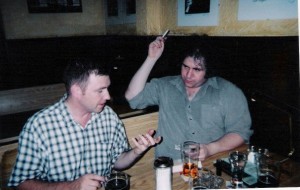 We are always describing our situations, but we rarely explicitly turn to ourselves with the imperative that we describe well—with the imperative, indeed, that we learn to describe.
We are always describing our situations, but we rarely explicitly turn to ourselves with the imperative that we describe well—with the imperative, indeed, that we learn to describe.
If we take on explicitly the task of describing our experience, we will discover that we can do this at a number of levels, each of which is important. Most obviously, we can say about these things surrounding us, “this thing is so and so,” and “that thing is such and such,” and I have already suggested a number of the issues that arise at this level. We could shift to another level of description, though, and notice that our experience always has a certain form, even as the specific things that surround us change.
Most simply, we can note that our experience always has this very form of experiencing a world of things. When we notice this, we are still involved in the same world we were in before, but we have shifted our focus away from the things experienced to the fact of our experiencing. We still experience things surrounding us, but through our experience of these things we recognize the event of experiencing.
When the event of experiencing has become the object of our attention, we now confront the task of describing this event well. For most of this, this turn of attention opens up an unexplored field of inquiry, and we have much to learn through this new project of description.
We have begun the description of the distinctive character of the event of experiencing by noting that it consistently takes the form of “a world of things.” We can notice further things about this world we experience. This world is one that appears to me: my perspective is an irremovable aspect of all my experience, and the world that I experience has as its character that it makes itself available to me. This “availability” of the world is its perceptibility—its appearing to my senses—but beyond this it is also an affording to me of possibilities for practical involvement: the world makes itself available to my exploration through bodily interaction.
And there is a further aspect to the event of experiencing that we must note if we are to describe it accurately: the world makes itself available to others at the same time and in the same way that it makes itself available to me. I experience the world of things, that is, as a shared world, a world that intrinsically is as much for others as it is for me.
We could carry on further our project of describing the event of experience, but we already have described enough to allow us to draw some important conclusions, (which is to say, to describe accurately some of the implications of our situation of experiencing).
First, we can notice that, though we typically think in terms of a “world in itself” or a “self in itself,” as if the world and the self existed on their own independentely, we never have an direct experience of either of these: the only world we ever experience is a world inherently related to experiencers, and the only self we ever experience is one wrapped up in specifics experiences of specific things. 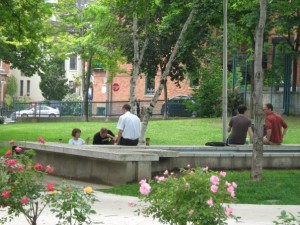 It is, indeed, true that the world presents itself to us as a reality that exists independent of our experience, but this very meaning only presents itself to us through the experiences we have of a world with which we are inherently involved. Similarly, the sense of an independent self is presented to us only through actual experiences of worldly engagement.
It is, indeed, true that the world presents itself to us as a reality that exists independent of our experience, but this very meaning only presents itself to us through the experiences we have of a world with which we are inherently involved. Similarly, the sense of an independent self is presented to us only through actual experiences of worldly engagement.
This first lesson is important because (among other reasons) we can recognize a number of important situations in which we rely upon the notion of an independently existing world or an independently existing self—most commonly in various scientific inquiries—and our accurate description of experience can give us resources for analyzing the quality of these putatively “scientific” descriptions. “Scientific” studies of the mind, for example, commonly substitute for a responsible appreciation of our living “first person” perspective” a “causal” analysis of the brain that is based on an interpretation of things as ruled by the laws of a world-in-itself. When the scientific vision is based on a misrepresentative description of our world, and the consequences of that vision are treated as prescriptions for dealing with our own lives, we risk importing into our lives an interpretive framework that does not truly fit it. In this example of contemporary “scientific” psychology, we end up living in a dishonest denial of our own subjectivity.
From our further observation of the intersubjective character of our world, we can draw a second lesson: there is no action we can take that is strictly “personal,” for our actions always inherently have an impact upon others. When we speak, when we do or don’t go out, when we walk down the street—in each of these cases (and every other case as well) we are choosing a world for others. When we describe “what I did” we often speak only from the perspective of our action’s relevance to ourselves; in fact, however, the significance of our action is not defined simply by its relationship to our own interests for our action is always inherently an intervention in the lives of others. We are dishonest in our descriptions when we do not acknowledge the intersubjective reality of our actions—what our actions are for others.
If we are honest, we will describe our world, and thence our actions, as for others. And what is an honest description of the experience of others?
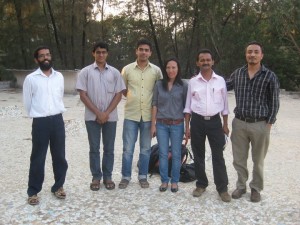 For a third and final description, we should notice that, like the world and like the self, the other self “in itself” is something of which we never have a direct experience. Rather, it is precisely through our experiences of the things of our world that we experience others. And how, then, do we experience the other? The other, never directly “present” to us in our experiences, is experienced through things as an imperative. The other is not a “thing” but is a call to us and precisely a call not to treat that other as a thing.
For a third and final description, we should notice that, like the world and like the self, the other self “in itself” is something of which we never have a direct experience. Rather, it is precisely through our experiences of the things of our world that we experience others. And how, then, do we experience the other? The other, never directly “present” to us in our experiences, is experienced through things as an imperative. The other is not a “thing” but is a call to us and precisely a call not to treat that other as a thing.
Here we see one of the most important and one of the most demanding challenges of descriptive honesty. Do we, in our speaking and in our behaviour, honestly reflect the definitive subjectivity of the others with whom we share the world, or do we allow ourselves the dishonest comfort of pretending that they are things, pretending that they are indifferent realities that do not demand our care? And, if we honestly acknowledge that we are dealing with others whenever we deal with things and not just when we directly and explicitly engage with that other body with the human face, we must further acknowledge that this question of interpersonal honesty is pervasively definitive of our experience of things: in all of our affairs, we must ask ourselves, “Do I deal with the things in my world in a way that honestly reflects the humanity that is intrinsic to them?”


 Participants in these
seminars consistently have the experience of growth in their conversation and
conceptual abilities, and typically leave with a transformed sense of the nature
and possibilities of philosophy.
Participants in these
seminars consistently have the experience of growth in their conversation and
conceptual abilities, and typically leave with a transformed sense of the nature
and possibilities of philosophy.





One Comment
In computer science, there is a formal principle of “Robustness” in data communication which says:
.. which I think echoes your point and extends it to suggest that we might also be mindful to listen as for the speaker.
Personally, I’m not always as good at this as I’d like to be. Great reminder; a favourite of your posts.